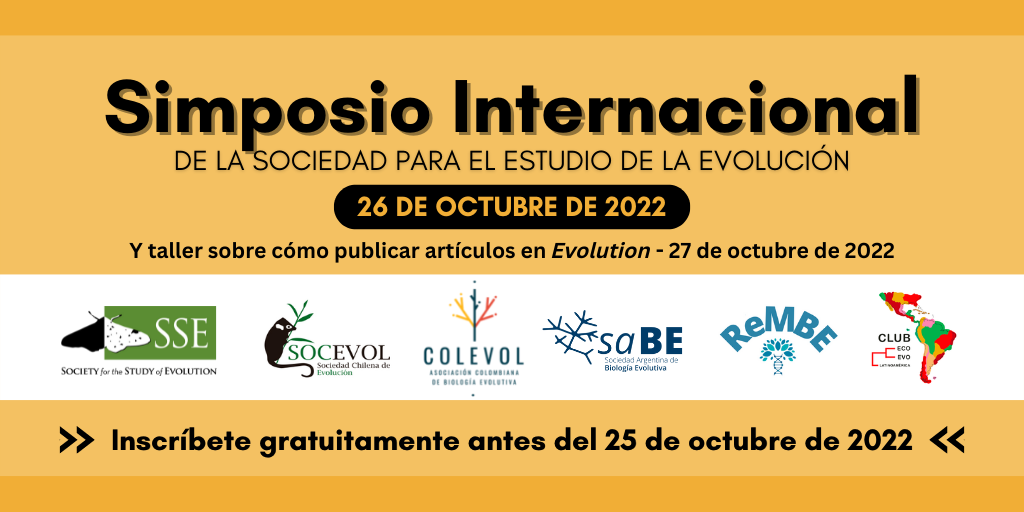
Simposio Internacional de la Sociedad para el Estudio de la Evolución
Read this post in English here.
Con el propósito de celebrar la diversidad de los miembros internacionales y reforzar los lazos con la comunidad global de biólogos evolutivos, la Sociedad para el Estudio de la Evolución (Society for the Study of Evolution - SSE) organizará una serie virtual y gratuita de simposios internacionales en diferentes idiomas y zonas horarias.
El primer Simposio Internacional de SSE se celebrará el miércoles 26 de octubre de 2022 y estará dirigido a la comunidad hispanohablante de Latinoamérica. Las charlas serán en español y contarán con traducción simultánea español-inglés.
Este simposio es organizado en colaboración con la Sociedad Chilena de Evolución (SOCEVOL), Asociación Colombiana de Biología Evolutiva (COLEVOL), Sociedad Argentina de Biología Evolutiva (SABE), Red Mexicana de Biología Evolutiva (ReMBE) y Club Eco-Evo Latinoamérica.
Las inscripciones al simposio y taller estarán abiertas hasta el martes 25 de octubre de 2022. Para registrate, diligencia el siguiente formulario: https://forms.gle/H7nLTF7sBq2NjVNg8
Continúa leyendo para más información.
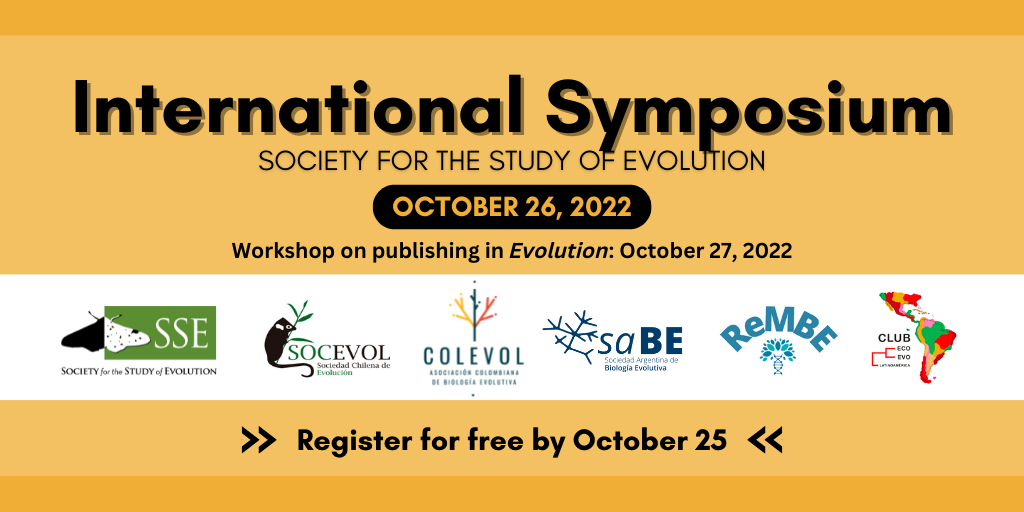
International Symposium of the Society for the Study of Evolution
Haga clic aquí para leer este anuncio en español.
To celebrate the diversity of the international membership and strengthen ties with the global community of evolutionary biologists, the Society for the Study of Evolution (SSE) will host a free virtual series of international symposia in different languages and time zones.
The first SSE International Symposium will be held on Wednesday, October 26, 2022 and will be aimed at the Spanish-speaking community in Latin America. The talks will be in Spanish with simultaneous Spanish-English translation.
This symposium is organized in collaboration with the Sociedad Chilena de Evolución (SOCEVOL), Asociación Colombiana de Biología Evolutiva (COLEVOL), Sociedad Argentina de Biología Evolutiva (SABE), Red Mexicana de Biología Evolutiva (ReMBE) and Club Eco-Evo Latinoamérica.
Registration for the symposium and workshop will be open until Tuesday, October 25, 2022. To register, please fill out the following form: https://forms.gle/H7nLTF7sBq2NjVNg8
Continue reading for more information about the speakers and schedule.
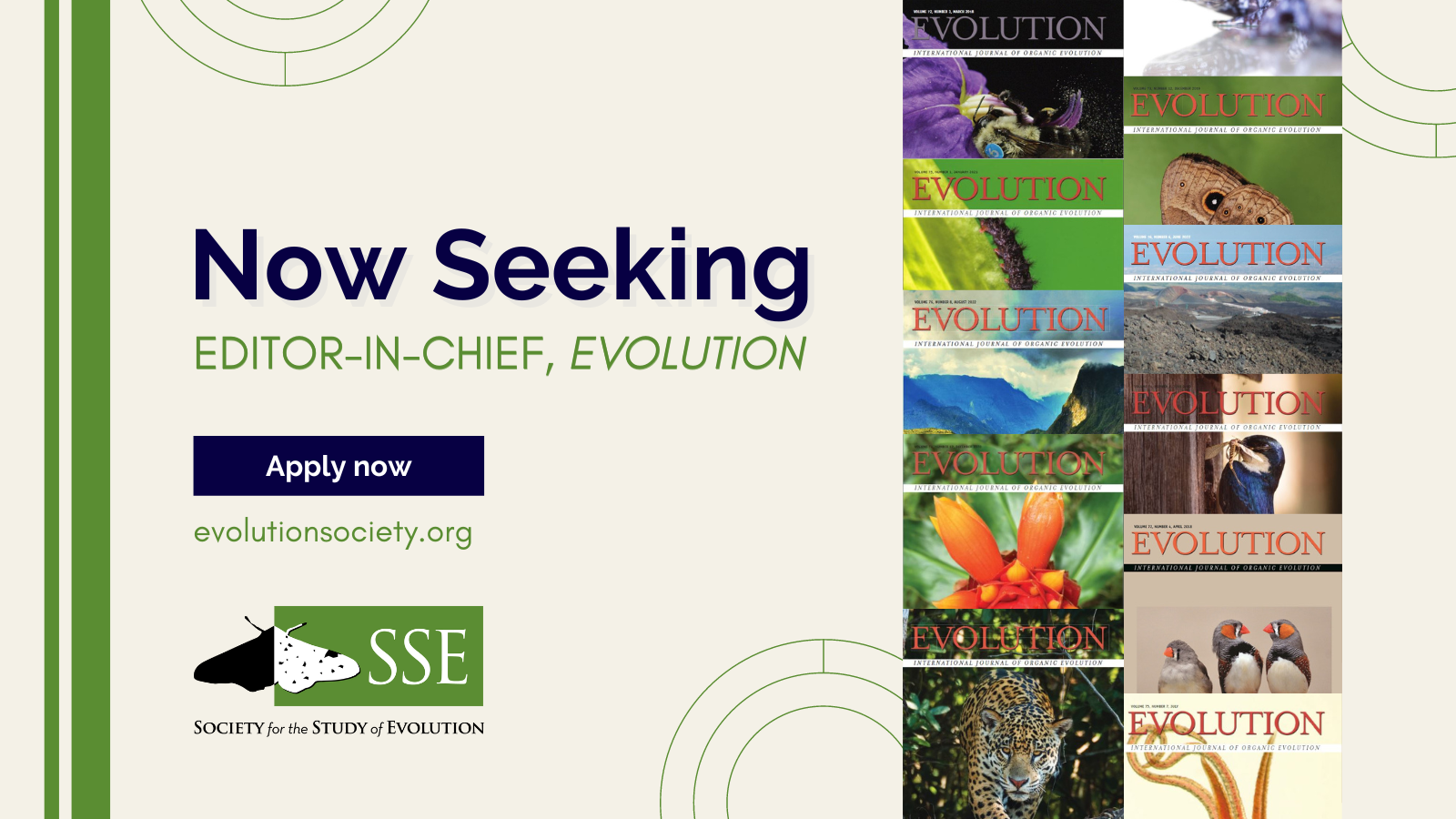
The Society for the Study of Evolution (SSE) seeks to fill the role of Editor in Chief (EiC) for the society’s flagship journal, Evolution, which aims to publish leading research from across the field of evolutionary biology.
The EiC is expected to be an evolutionary biologist with a broad overview of the field. Main responsibilities are building on the success of the journal, fostering the journal’s growth with a focus on maintaining its quality, and encouraging submissions of the best research articles in the field. The EiC will oversee and work hand in hand with a board of Handling Editors and Associate Editors, our publisher, the Digests Editor, a social media/communications editor, and a Managing Editor. We encourage applications from scientists from across career stages and from all subdisciplines related to evolutionary biology. While preferred, you do not have to be a current member of SSE to apply.
Diversity, equity, and inclusion are core values of SSE. We are committed to ensuring that all of our activities reflect those values. We strongly encourage applications from researchers identifying as members of historically marginalized groups in STEM.
Continue reading for full instructions.
We are pleased to announce that starting in January 2023, Evolution and Evolution Letters will be published by Oxford University Press. This decision comes after more than a year of work by our Publications Committee in consultation with the councils of SSE and the European Society for Evolutionary Biology, our co-publisher of Evolution Letters. SSE members will still enjoy free publication in Evolution and deep discounts on Open Access publication in both journals. Additionally, fee waivers will be offered to Evolution Letters authors as needed to help overcome financial barriers to publishing Open Access work. Authors will still submit manuscripts through ScholarOne. Articles submitted after October 1 for Evolution and after December 1 for Evolution Letters will be managed through OUP.
OUP has a strong history of publishing society journals, and we look forward to working with them to continue to publish significant new advances from our members and community! Read the full announcement from OUP.
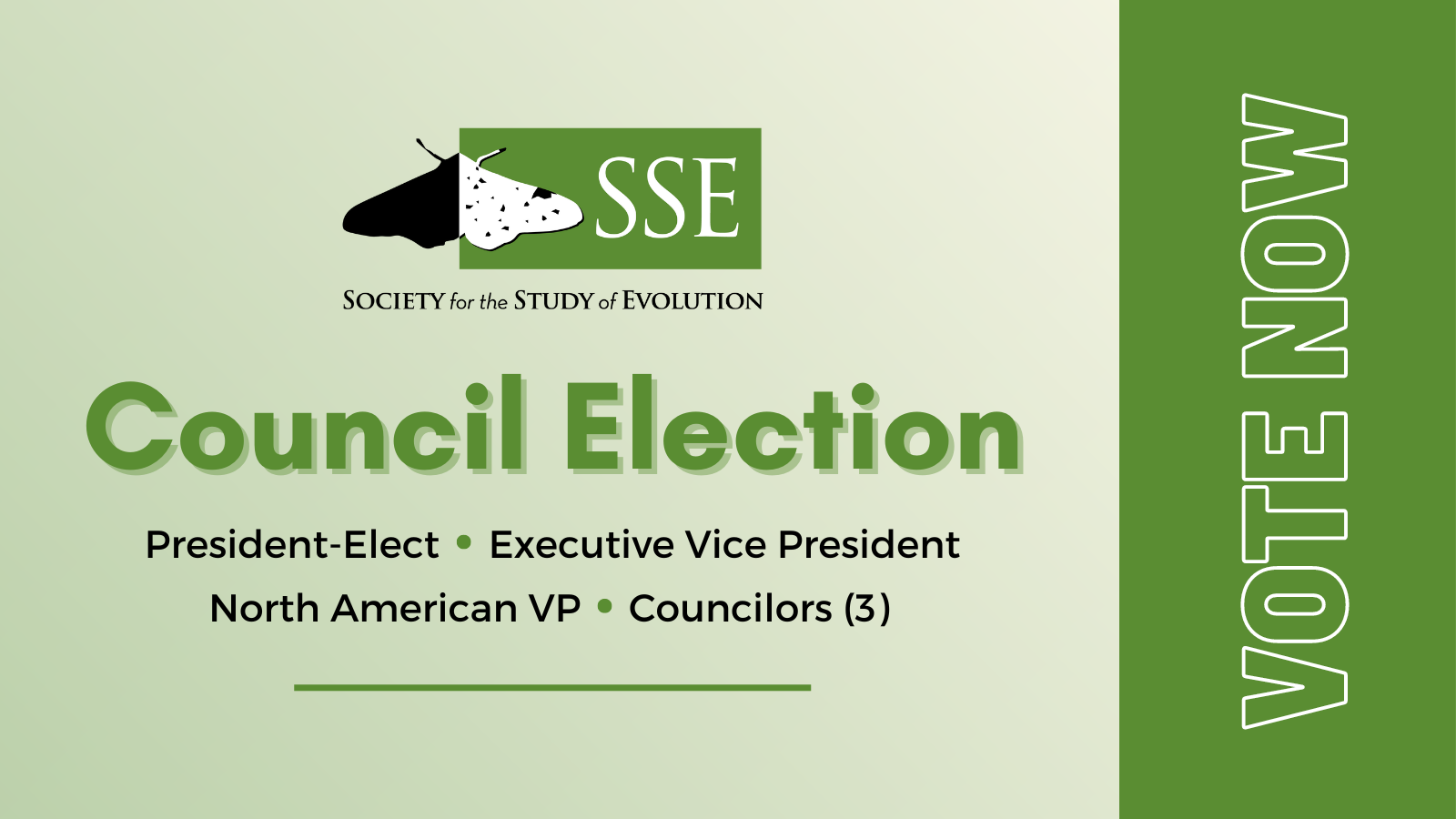
The 2022 Council Election is now open!
SSE members should have received an email with a link to the ballot. Positions turning over this year: President-Elect, Executive Vice President, North American Vice President, and 3 Councilors. Newly elected councilors will start their terms January 1, 2023. Voting ends November 4!
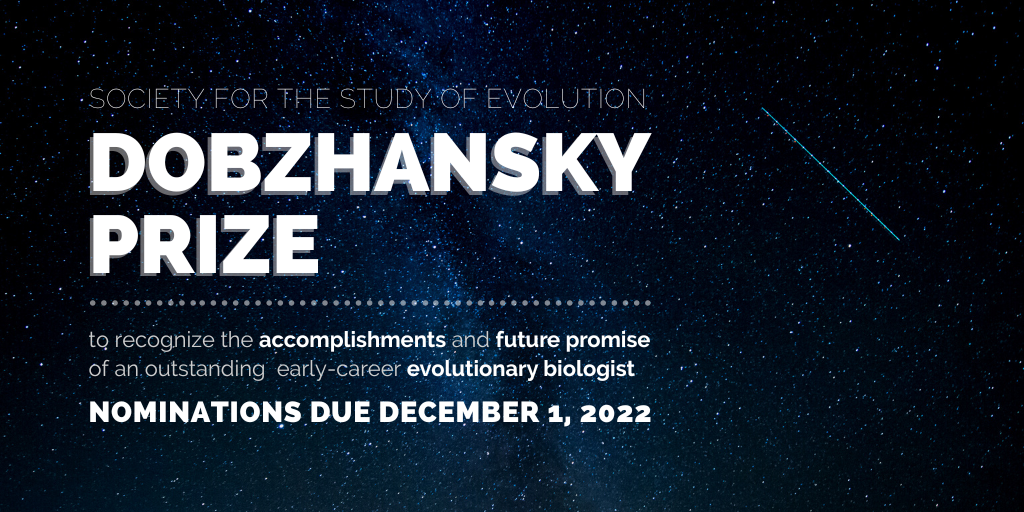
SSE is now accepting nominations for the Theodosius Dobzhansky Prize to recognize the accomplishments and future promise of an outstanding early-career evolutionary biologist.
We consider candidates working on all areas of evolutionary biology, broadly defined. The nominee's university must have officially awarded their degree (Ph.D. or equivalent) between December 1, 2018 and December 1, 2022, though the committee will consider circumstances that may extend eligibility. We are specifically looking for candidates who take creative approaches to answering pressing questions in evolutionary biology. We will consider people working on any taxonomic group (i.e., plants, animals, fungi, microbes, etc.) and who take empirical and/or theoretical approaches. We value diversity, and are seeking a broad and diverse applicant pool from all axes and components of diversity in the evolutionary biology community. We welcome nominations of researchers around the globe.
The Dobzhansky Prize is accompanied by a check for U.S. $5000, and is awarded at the annual Evolution meeting. The recipient is expected to be present to receive the award and to give an oral presentation about their research.
Learn more about the eligibility requirements and how to apply. Deadline: December 1, 2022
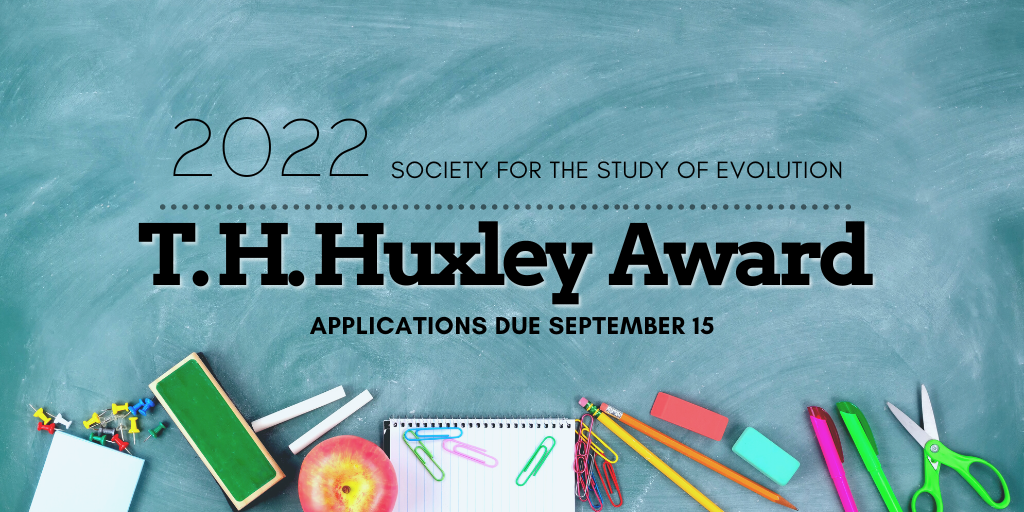
Are you developing an interesting educational project, resource, or activity? Consider applying for the T. H. Huxley Award, which recognizes and promotes the development of high quality evolution education resources. Graduate students and postdoctoral fellows are especially encouraged to apply.
The recipient will receive funding to attend and present their evolution education resources at the National Association of Biology Teachers (NABT) annual conference, held this year in Indianapolis, IN, USA on November 10-13, 2022. Awardees may present at an alternative education-focused conference with approval from the Education and Outreach Committee. You must be an SSE member to apply. Learn more and apply here by September 15, 2022.
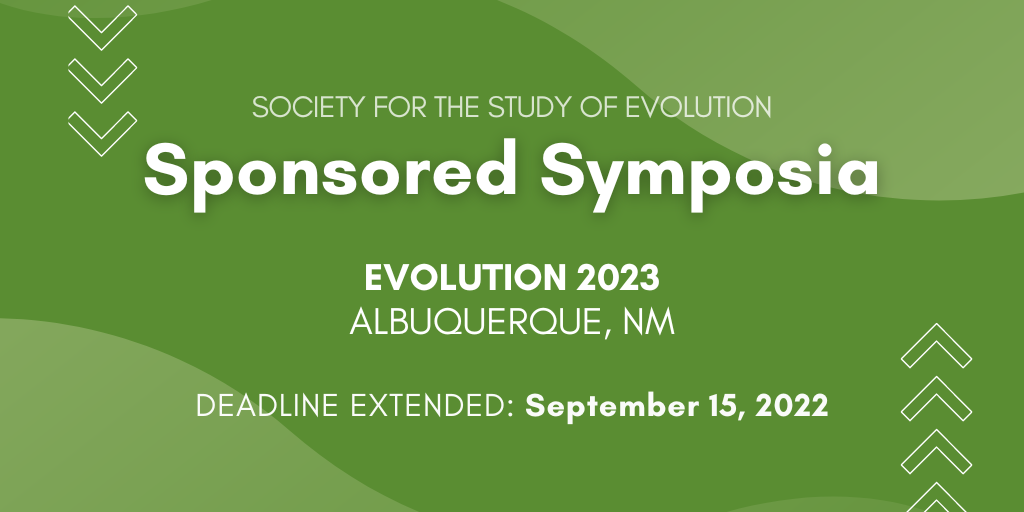
Do you have a topic you'd like to see covered at the 2023 Evolution Meeting? Consider submitting a proposal for SSE's Sponsored Symposia! SSE Council seeks proposals that highlight new topics, provide new perspectives, or generate new syntheses. This symposia will consist of six half-hour talks.
SSE Council seriously considers the diversity of participants as a criterion for symposium funding. Symposium organizers are expected to take into account gender, seniority, nationality, and other axes of diversity traditionally underrepresented in Society symposia, and to describe their efforts in the proposal.
The Society provides travel support for organizers and participants in sponsored symposia up to $9000 per symposium, plus any applicable costs. SSE will accept requests for additional funds for dependent care costs if this would allow a speaker to accept an invitation to speak in a sponsored symposium.
Learn more and submit your proposal by September 15, 2022.
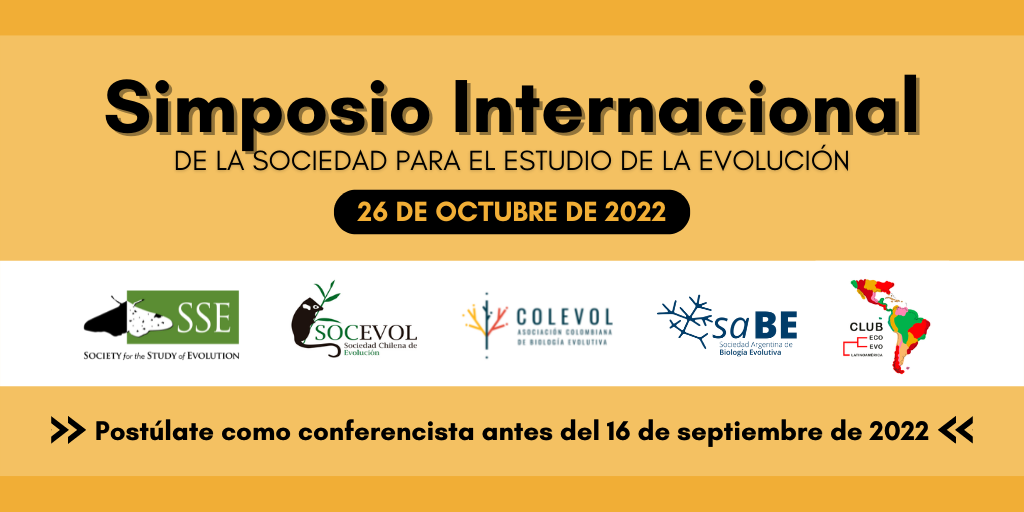
Llamado para postularse como conferencistas
Fecha: Miércoles, 26 de octubre de 2022
La Sociedad para el Estudio de la Evolución (Society for the Study of Evolution - SSE) es una organización internacional que promueve el entendimiento de la biología evolutiva y sus subdisciplinas. Entre sus actividades, se destacan la publicación de las revistas Evolution y Evolution Letters y la organización anual de la conferencia Evolution.
Con el propósito de celebrar la diversidad de sus miembros internacionales y reforzar sus lazos con la comunidad global de biólogos evolutivos, SSE organizará una serie virtual y gratuita de simposios internacionales en diferentes idiomas y zonas horarias.
El primer Simposio Internacional de SSE estará dirigido a la comunidad hispanohablante de Latinoamérica y contará con traducción simultánea español-inglés. Este evento será organizado en colaboración con la Sociedad Chilena de Evolución (SOCEVOL), la Asociación Colombiana de Biología Evolutiva (COLEVOL), la Sociedad Argentina de Biología Evolutiva (SABE) y el Club Eco-Evo Latinoamérica.
El simposio será seguido de un taller sobre cómo publicar artículos en la revista Evolution, dirigido por los editores asociados Nicole Valenzuela (Iowa State University), Santiago Ramírez (University of California Davis), Aida Gómez-Robles (University College London) y Juan Diego Gaitán-Espitia (University of Hong Kong).
SSE invita a sus miembros a postularse como conferencistas de este evento. Pretendemos destacar el trabajo en biología evolutiva conducido por investigadores jóvenes (estudiantes de posgrado e investigadores postdoctorales) y académicos establecidos (líderes de grupos de investigación y profesores universitarios) en Latinoamérica. Todos los conferencistas recibirán un honorario por su participación:
Investigador joven: 6 charlas, 15 min,* honorarios de USD 100
Investigador senior: 2 charlas, 30 min,* honorarios de USD 200
* Sin incluir el tiempo para preguntas.
Si estás interesado en participar en este evento como conferencista, por favor envíanos los siguientes datos en un único archivo de PDF al correo electrónico GSAC@evolutionsociety.org antes del 16 de septiembre de 2022:
- CV
- Carta de motivación de máximo 1 página describiendo:
- Pronombres, estadio profesional (investigador joven o senior) e instituciones de afiliación.
- Experiencia de investigación en biología evolutiva en Latinoamérica.
- Descripción breve y general del tema tentativo de la charla.
- Motivación para participar en el evento.
Si aún no eres miembro de SSE, puedes unirte aquí. SSE ofrece membresías gratuitas o con descuento para biólogos evolutivos en 152 países y territorios, incluyendo Argentina, Bolivia, Chile, Colombia, Costa Rica, Cuba, Ecuador, El Salvador, Guatemala, Honduras, México, Nicaragua, Panamá, Paraguay, Perú, Puerto Rico, República Dominicana, Uruguay y Venezuela.
Los conferencistas serán elegidos cubriendo varios ejes de diversidad para garantizar una representación equitativa de la comunidad de biólogos evolutivos latinoamericanos. Los resultados del proceso de selección se conocerán el 22 de septiembre. Si tienes alguna inquietud, no dudes en contactarnos.
Evolution seeks nominations and self-nominations for Associate Editors to serve on the Evolution editorial board. We strongly encourage nominations and self-nominations of individuals who represent the full diversity of the evolutionary biology community, including (but not limited to) all aspects of identity and background, types of institution, geographic location, or scientific approach. We strongly encourage nominations and self-nominations of individuals who have a demonstrated commitment to advancing equity and inclusion in science. There are 20 associate editor positions open every year, with 3-year terms beginning January 1. Nominate yourself or someone else by September 30, 2022.

The SSE Education Committee is pleased to announce the 2022 T.H. Huxley award, named in honor of Darwin's very public supporter, which recognizes and promotes the development of high quality evolution education resources. If you have an interesting project or educational activity to share, consider applying for this award. Graduate students and postdoctoral fellows are encouraged to apply.
This award provides funding for an SSE member to present evolution education resources at the National Association of Biology Teachers (NABT) annual conference. This year’s NABT conference will be held November 10-13, 2022 in Indianapolis, IN. Awardees may instead present at an alternative education-focused conference with approval from the Education and Outreach Committee.
The application form will be posted on the website when available. Applications will be due September 15. Learn more.
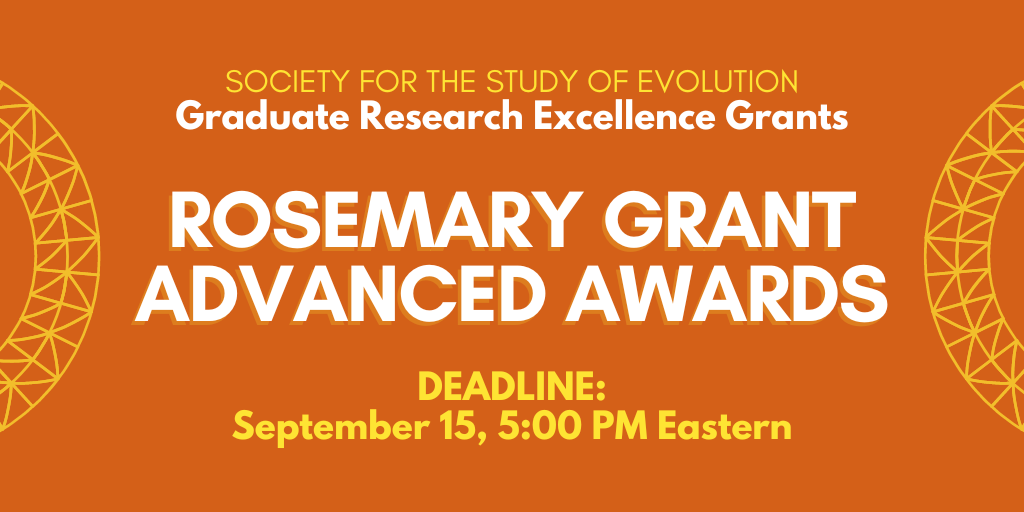
The Rosemary Grant Advanced Awards, part of the Graduate Research Excellence Grants, are to assist students in the later stages of their PhD programs. Funds can be used to enhance the scope of dissertation research, such as to conduct additional experiments or field work. Awards up to US$3500 will be granted.
Students are eligible if they are SSE members, will defend after September 15, 2023, and are either 1) in at least their 3rd year of a >4-year doctoral degree program, 2) in the 2nd year of a 3- to 4-year program, or 3) otherwise deemed “advanced” by a letter from their advisor or graduate director. Students should also confirm that the proposed work is outside the scope of other funding currently held by either the student or their advisor.
This award is not limited to students in the United States, and we welcome applications from our international members.
Application instructions and evaluation criteria are now available on the Rosemary Grant Advanced Award page.
Deadline: September 15, 2022, 5:00 PM Eastern
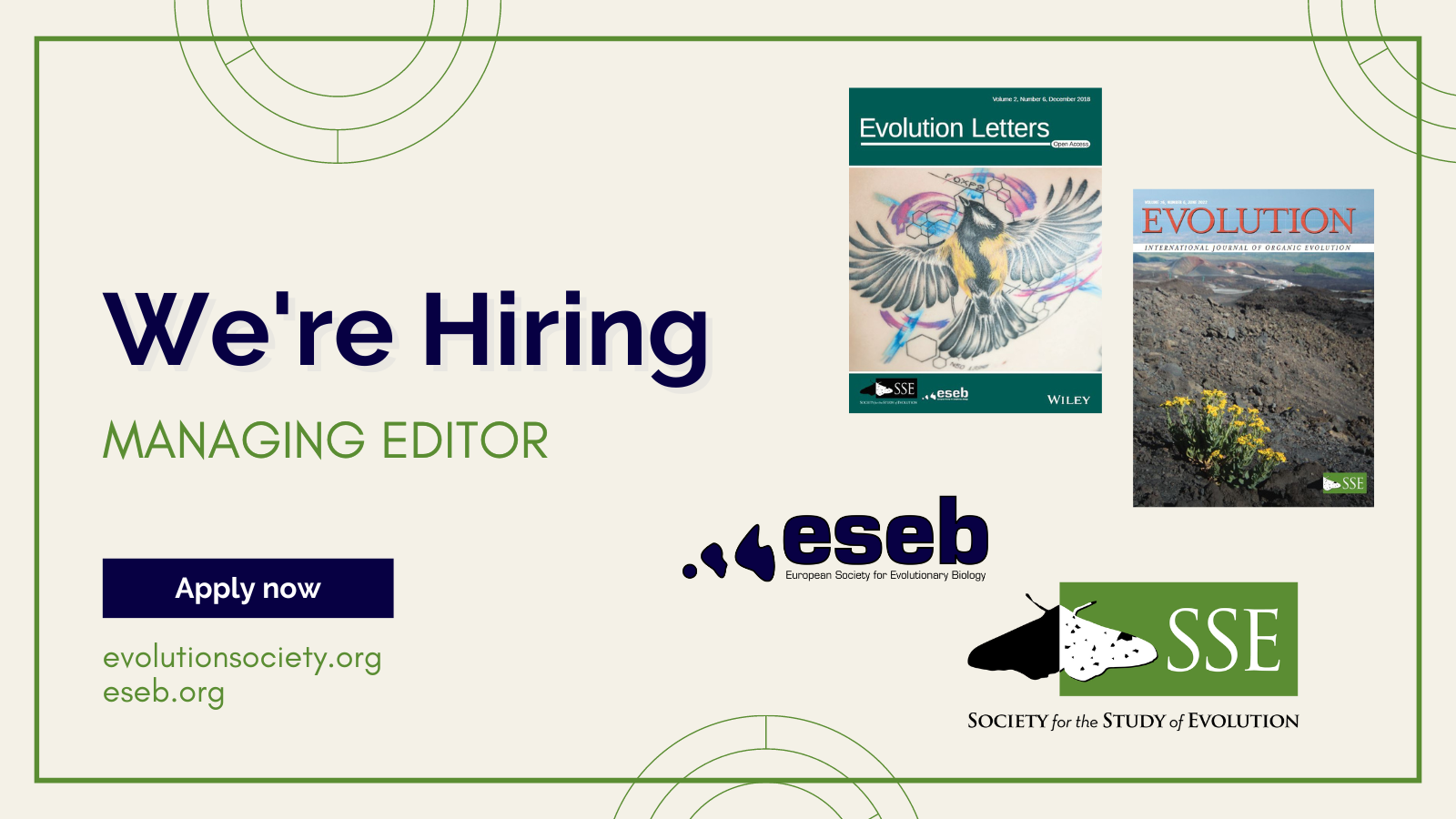
We are excited to announce a new Managing Editor position for Evolution and Evolution Letters. This role will include the management of all aspects of receiving, reviewing and processing submitted manuscripts for both journals. It will also involve the coordination of special and virtual issue content, and raising the profile of the journals through media platforms. Continue reading for more information.
This position has now been filled.

The Rosemary Grant Advanced Awards, part of the Graduate Research Excellence Grants, are to assist students in the later stages of their PhD programs. Funds can be used to enhance the scope of dissertation research, such as to conduct additional experiments or field work. Awards up to US$3500 will be granted.
Students are eligible if they are SSE members, will defend after September 15, 2023, and are either 1) in at least their 3rd year of a >4-year doctoral degree program, 2) in the 2nd year of a 3- to 4-year program, or 3) otherwise deemed “advanced” by a letter from their advisor or graduate director. Students should also confirm that the proposed work is outside the scope of other funding currently held by either the student or their advisor.
Application instructions and evaluation criteria will be posted on the Rosemary Grant Advanced Award page when available.
Deadline: September 15, 2022, 5:00 PM Eastern
Who are your evolutionary biology heroes? Who do you know whose conceptual advances, impactful publications, outreach and education efforts, mentorship and training, service to the community, or diversity and inclusion work has contributed to the evolutionary biology field and community? Maybe it’s you! Consider nominating yourself or someone else for the SSE Lifetime Achievement Award. Nominations for the 2023 award have been reopened with a deadline of September 15, 2022. Nominators will be asked to complete a short form describing the nominee’s contributions to the field and community. A detailed nomination letter is not required for the initial nomination. Learn more and submit your nomination by September 15!
In the New Faculty Profiles, we invite highlighted faculty to discuss their research, describe how SSE has impacted their career, and share any tips or stories they may have for other researchers. This month we highlight Dr. Kara Layton, who studies diversity in aquatic ecosystems, with a focus on hyperdiverse marine invertebrates.
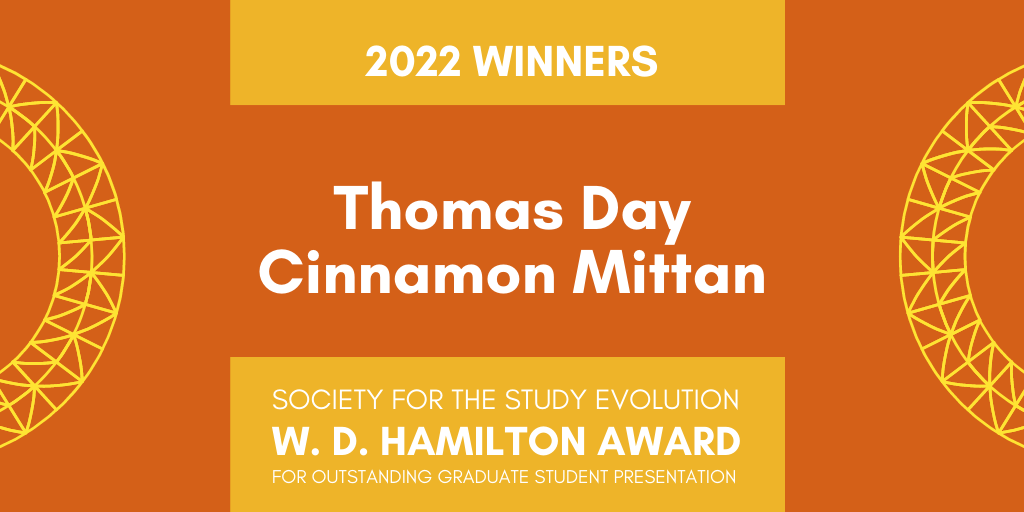
Congratulations to the winners of the 2022 W. D. Hamilton Award for Outstanding Graduate Student Presentation:
Thomas Day, Georgia Institute of Technology
Cinnamon Mittan, Michigan State University
Thomas's talk was titled "Multicellularity as a Darwinian material: the biophysical basis of de novo multicellular adaptation during long-term experimental evolution." Cinnamon's talk was titled "Adaptation during range expansion: a phylogenetic, population genetic, and physiological perspective." Both can be viewed in the Evolution 2022 meeting virtual platform by all meeting registrants.
Thank you to all the finalists who presented an outstanding symposium at Evolution! All finalists' talks can be viewed in the Hamilton Award Symposium on the virtual platform - find them under Live Sessions. Thank you also to our Hamilton Award judges who continue to make this symposium and award possible! We appreciate your service.
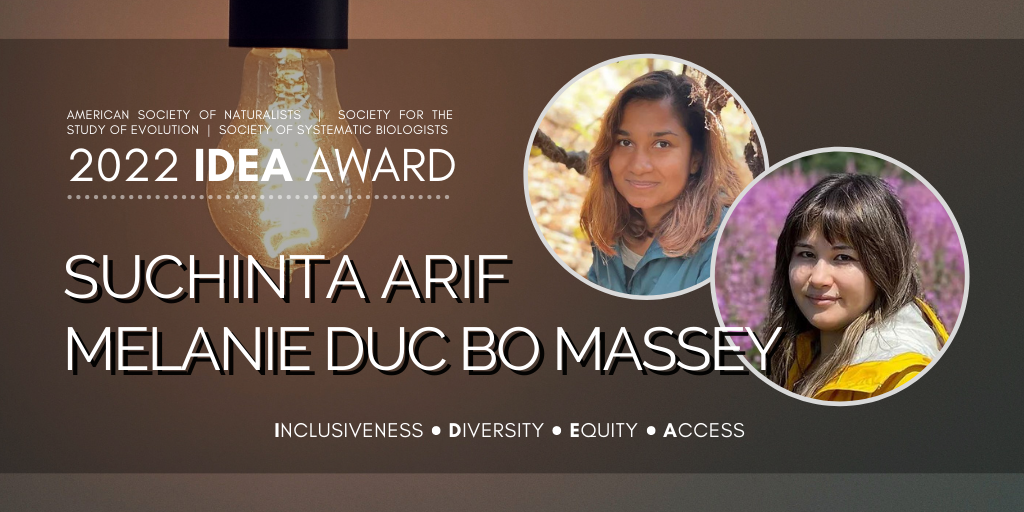
Congratulations to the recipients of the 2022 Inclusiveness, Diversity, Equity, and Access (IDEA) Award, PhD candidates Suchinta Arif and Melanie Duc Bo Massey, cofounders of the scientific outreach organization Diversity of Nature (DoN). Arif and Massey founded Diversity of Nature at Dalhousie University (Nova Scotia, Canada) in 2020. DoN is specifically designed to be led by BIPOC scientists and aimed at BIPOC youth, with the goal of increasing BIPOC representation in the natural sciences. DoN’s array of inclusive programming includes panels, workshops, and an annual field camp, all free of charge to participants. Arif and Massey have also led publications on actionable guidance for supporting and retaining underrepresented students in evolution and ecology and accrued impressive portfolios of additional teaching, outreach, and DEI-related activities. Thank you Suchinta and Melanie for your dedication to increasing BIPOC representation in the natural sciences!
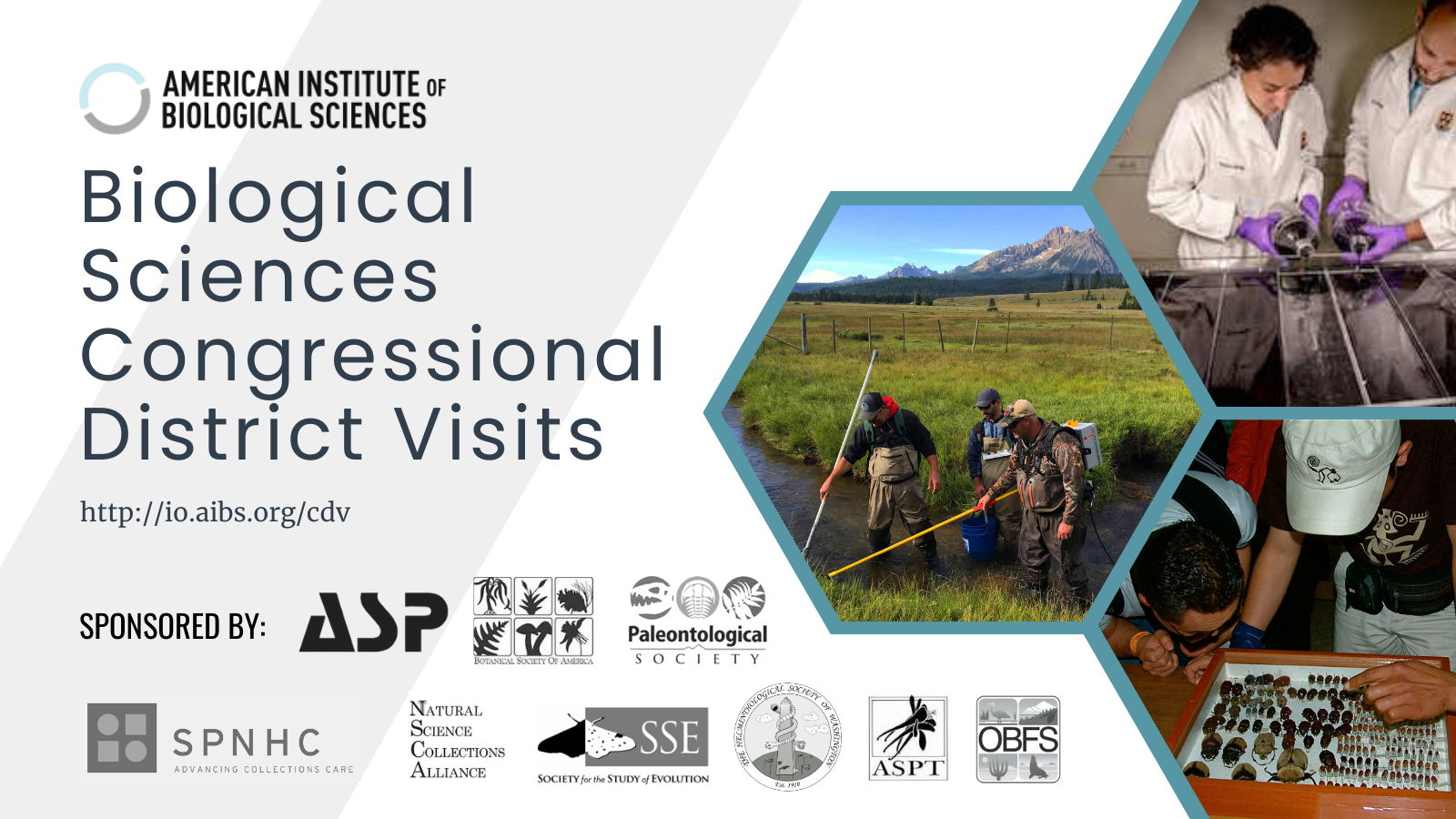
The Society for the Study of Evolution is pleased to announce that we are once again joining with the American Institute of Biological Sciences to sponsor the 13th annual Biological Sciences Congressional District Visits event.
This national initiative is an opportunity for scientists across the country to meet with their federal or state elected officials to showcase the people, facilities, and equipment that are required to support and conduct scientific research.
The Biological Sciences Congressional District Visits event enables scientists, graduate students, representatives of research facilities, and people affiliated with scientific collections to meet with their federal or state elected officials without traveling to Washington, DC. Participating scientists can meet with their elected officials at the local district office, virtually, or may invite them to visit their research facility. Meetings will take place mid-July through October, depending on the participant’s schedule and their lawmaker’s availability.
SSE members who participate will receive one-on-one support and online training to prepare for their tour or meeting.
We encourage our members to participate in this important event. Participation is free for SSE members, but registration is required.
Registration will close on July 15, 2022. To register, visit io.aibs.org/cdv.
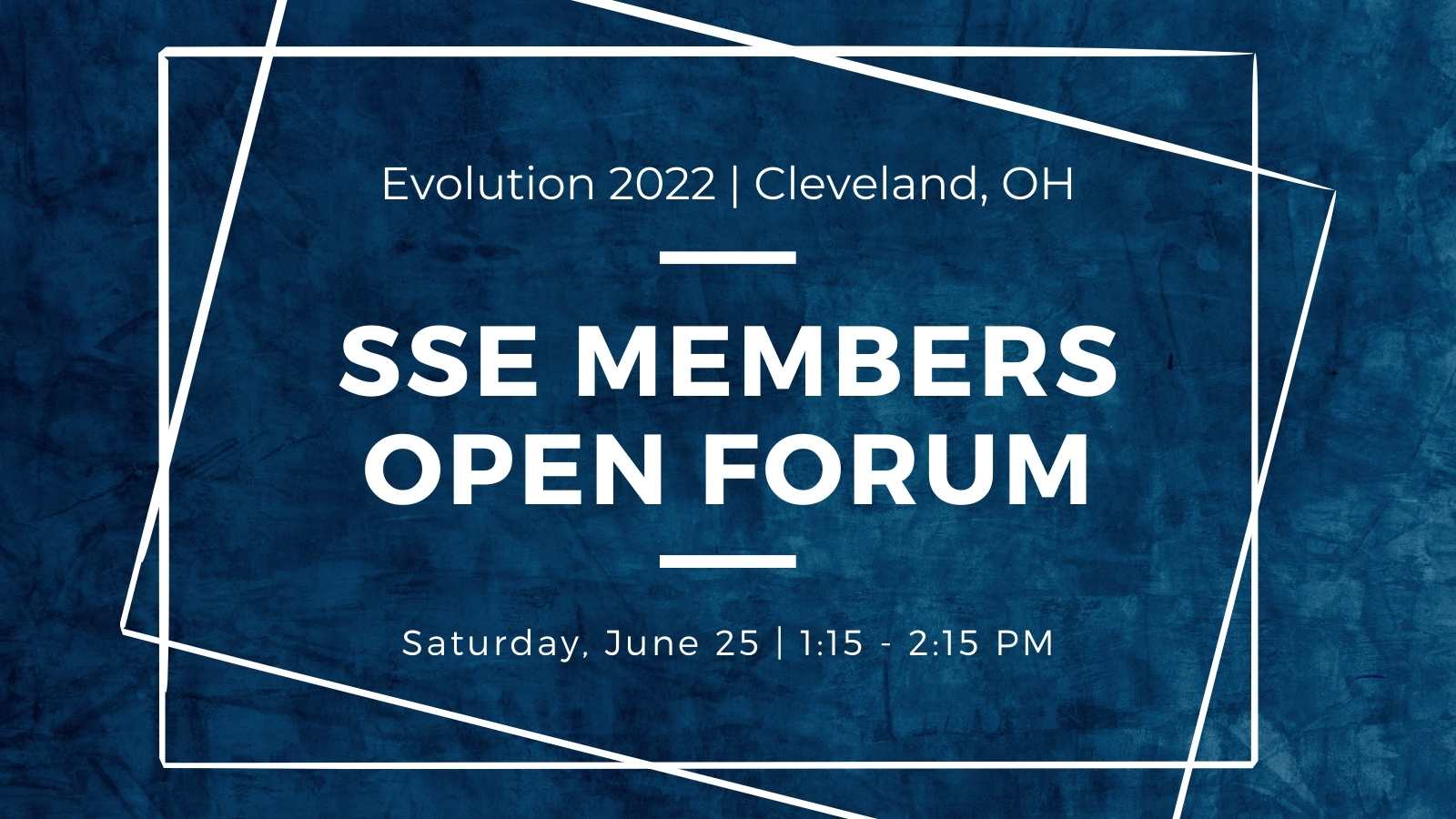
SSE Members Open Forum
Evolution 2022 - Cleveland, OH
Saturday, June 25, 1:15 - 2:15 PM
We want to hear from you! All SSE members attending the in-person portion of the Evolution 2022 meeting in Cleveland, OH are invited to the SSE Members Open Forum.
SSE Council invites you to submit your questions and topics for discussion at the forum ahead of time. Want to know more about how SSE works? Want SSE leadership to discuss awards, publications, conferences, or other topics? Let us know!
We will cover as many as possible during the forum. Questions and topics will be accepted until June 15, 2022.
Submit your questions and discussion topics here.
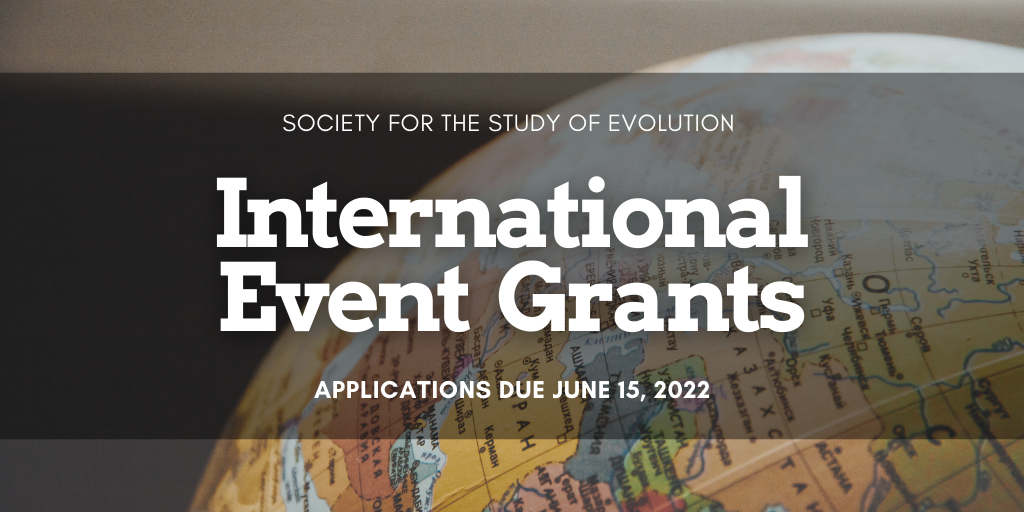
The SSE International Committee is now accepting applications for the SSE Inernational Event Grants. The goal of these grants is to foster communication and collaboration between scientists from different countries by sponsoring international symposia, workshops, courses, and other events within the field of evolutionary biology. Our priority is to support events that benefit emerging communities in the field of evolutionary biology. The deadline to apply has been extended to June 15, 2022.
Learn more and apply here.
The 2023 annual meeting of the Society for the Study of Evolution (SSE) is planned for June 21-25, 2023 in Albuquerque, NM, USA. The SSE Council invites proposals for one sponsored symposium at the meeting that highlights new topics, provides new perspectives, or generates new syntheses. This symposia will consist of six half-hour talks.
Proposals are due September 1, 2022. Learn more.
Are you a graduate student planning on arriving in Cleveland slightly ahead of the meeting and looking for a way to get in the scientific mood while also exploring the city during the afternoon? Well, search no more, for the SSE Graduate Student Advisory Council(GSAC) is organizing a pre-meeting curator-led tour of Cleveland Museum of Natural History’s collections at 2:30pm on June 24th (meeting time 1:45pm). GSAC will cover the costs for entry and transport between the Huntington Convention Center and the Museum, so it is completely free. To participate, just fill out the following form: https://bit.ly/3GAKLHG
This event is limited to 20 graduate students, and the deadline to register is June 15th.
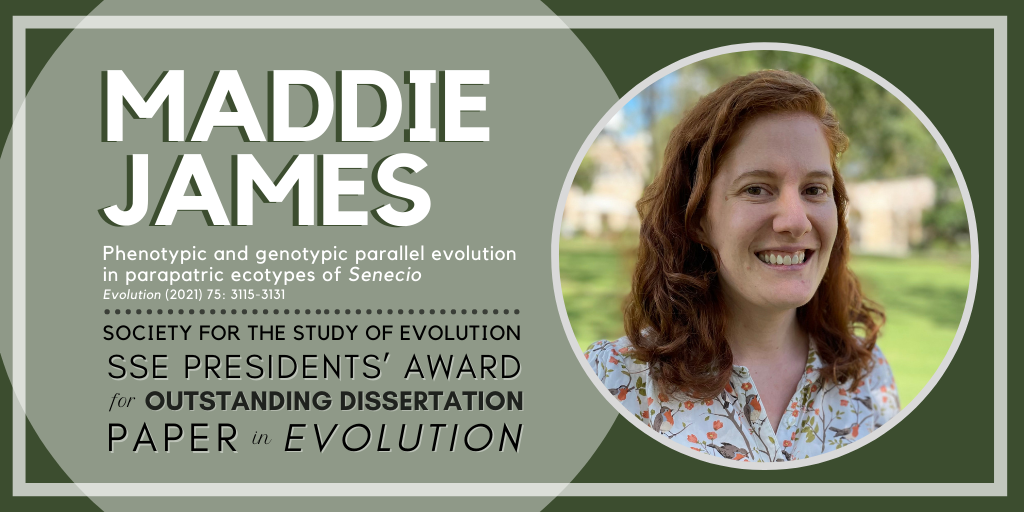
Congratulations to the 2022 winner of the SSE Presidents' Award for Outstanding Dissertation Paper in Evolution, Dr. Maddie E. James, for her paper, “Phenotypic and genotypic parallel evolution in parapatric ecotypes of Senecio.” Evolution (2021) 75-12: 3115–3131.
In this paper, Dr. James and co-authors investigated potential parallel evolution in dune and headland ecotypes of the Australian wildflower Senecio lautus. A comparison of nine dune-headland pairs, most phylogenetic sister groups, found strong parallel evolution of phenotype of branch and leaf traits with dune plants tall and headland plants prostrate. Despite phenotypic similarity among populations within each ecotype, evolutionary change was found in different genes. However, further investigation found a number of these genes had the same predicted function. This study shows response to selection that leads to parallel phenotypes is more complex when viewed at the underlying genetic level. Dr. James earned her Ph.D. at the University of Queensland, where she is now a Postdoctoral Research Fellow.
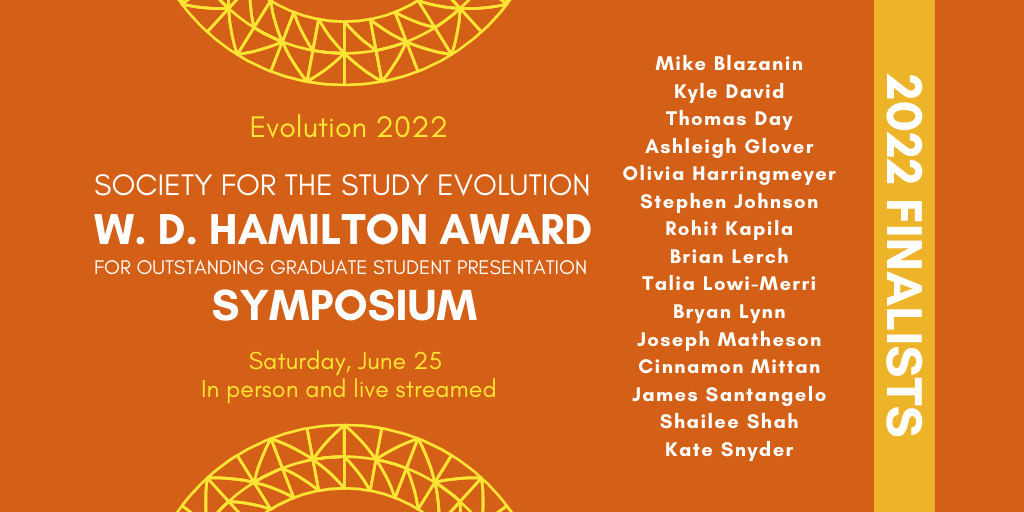
Congratulations to the finalists for our outstanding graduate student presentation award: Mike Blazanin, Kyle David, Thomas Day, Ashleigh Glover, Olivia Harringmeyer, Stephen Johnson, Rohit Kapila, Brian Lerch, Talia Lowi-Merri, Bryan Lynn, Joseph Matheson, Cinnamon Mittan, James Santangelo, Shailee Shah, and Kate Snyder.
These finalists will present their work during the W.D. Hamilton Award Symposium at the in-person portion of the Evolution meeting in Cleveland, OH on June 25. This in person event will also be live streamed for all meeting participants.